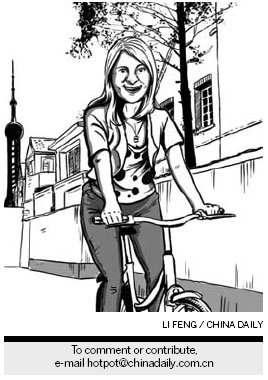My bike keeps me in touch with Shanghai
(China Daily)
2011-01-20 15:00
 |
Large Medium Small |

I never anticipated the liberating sense of freedom that was ignited by two wheels, a shiny red frame, an oversized front basket and a mismatched but completely essential pink bell.
When I adopted my bike I decided it was only fitting that he should have a Chinese name. So I contemplated some of my favorite Chinese words.High on the list was mama huhu, but it means "so-so" and that doesn't describe it.
So, after much deliberation I settled on the name Ping Guo, meaning apple, my favorite fruit.
My beloved bike is so much more than a mode of transport. It has been the magic carpet that has made Shanghai feel totally accessible, even when taxis are cheap and plentiful and new metro lines are sprouting.
While my bike is more novelty than essential commodity, historically in China the humble two-wheeler has played a more significant role. My Chinese friends tell me of days gone by when bikes were not only the main mode of transportation, but also one of the "three musts for marriage" (the other two being a watch and a Sartorius sewing machine).

Perhaps indicative of this country's development, the three "musts" evolved in the late 1980s to fridges, color televisions and washing machines, and bikes were slowly replaced with battery-powered bicycles, motorcycles and cars.
My first cycling adventure was with my friend Lin, riding around the old French Concession. We stopped at our favorite restaurant, then embarked on a bar crawl of sorts, weaving through the streets, parking outside each new bar and chaining up our bikes, then heading inside for a couple of drinks.
Soon enough we would make our way back outside and climb on again in search of the next venue.It was liberating to ride around the busy streets, feeling the mild April air and admiring the trees in full bloom forming a luscious green archway as we rode underneath.
On another occasion, Lin's bike refused to release the lock, rendering itself paralyzed on the street corner. We were thankful it was still there when we returned the next morning.
There is no doubting the city's rapid development, but this progress has broadened Shanghai's urban sprawl, meaning residents are forced to live further away from their places of work. For many, it is no longer viable to ride a bike to and from their jobs; instead they are taking buses or the subway, and traveling for one to two hours each way.
In contrast to this development, the availability of roadside bike maintenance is perhaps one of the few rituals that has dug in its heels and resisted change. Whether it's having a seat adjusted, tires pumped, a chain re-looped or a new basket attached, the men operating the city's numerous makeshift "pit shops" are never hard to find.
They operate from tiny roadside stalls. Occasionally they can be found at street corners, with nothing more than a rusty manual pump by their side, as they relax on a deck chair, usually with a cigarette dangling from the corner of their mouth. A couple of kuai later, the bike is in good working order and ready to hit the streets again.
From the back seat of a taxi, I rarely notice the world going on outside. But on my bike, I see the lanes where ladies hang out their washing. I hear animated arguments between shopkeepers and customers. I smell buns from roadside stalls and observe at close-range the caged ducks that balance on the back of motorcycles.
My bike removes the sensory blindfold that would otherwise prevent me from truly seeing, hearing and smelling life on the streets of Shanghai.
For China Daily
| 分享按钮 |